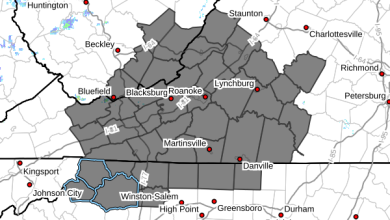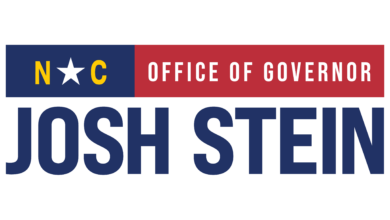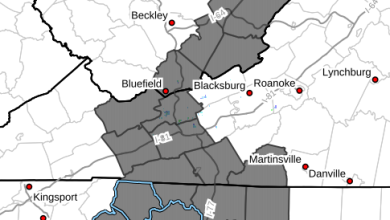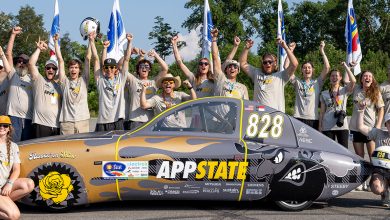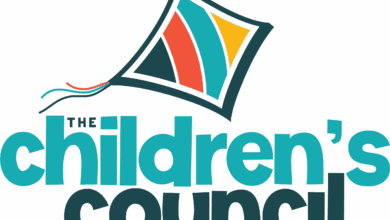
Last Updated on December 12, 2023 9:24 am
WATAUGA — Five educators in Watauga County Schools were recently awarded with Bright Ideas grants through Blue Ridge Energy. These grants, which are sponsored annually by Blue Ridge Energy help further traditional academic learning by funding innovative scholastic programs proposed by educators.
WCS recipients are Alex Miller (Green Valley School), Carly Pugh (Cove Creek School), Erin Thompson (Valle Crucis School), Hope Mough (Bethel School) and Tyler Hagan (Cove Creek School).
Recipients were recognized at a luncheon celebration at Blue Ridge Energy and at the Dec. 11 Board of Education meeting by WCS Superintendent Dr. Leslie Alexander.
Miller was awarded with a grant totaling $899 to use in her self-contained classroom at Green Valley School. Her project, entitled “Indoor Hydroponic Growing System” is already underway. She shared that since getting the hydroponic growing system in her classroom, students have shown a real interest in the plants.
“They have already begun to sprout and the students can see the noticeable changes daily,” Miller said. “We have 50 different plant varieties currently growing including different types of lettuces, peppers, tomatoes, and a variety of herbs.”
As part of their science lessons, Miller wanted to incorporate hands-on lessons pertaining to germination, plant life cycle, healthy eating and creating healthy recipes. She was interested in having a garden but the varying weather conditions in Watauga County caused her to explore indoor options. As she researched her options, she came across a hydroponic growing system that uses AI technology to monitor plant growth. The system Miller purchased for her classroom has its own watering system and includes LED lights and a camera that corresponds to an app to help monitor the health of the plants.
Her goal is for the indoor growing system to introduce plant life cycles, introduce healthy eating and create an interest in gardening.
“I want the kids to have year-long exposure to the plants and to be able to witness all the plant life cycles that we can experience without having to contend with the weather,” Miller said.
Pugh was awarded with a grant totaling $481 to use in her classroom at Cove Creek School. Her project, entitled “Social Studies Through Stories” will allow them to read a story about one person or place to build a connection with the entire subject.
She shared what led her to come up with the idea for this project.
“I have a Master's degree in Library Science and work with wonderful Language Arts teachers,” Pugh said. “We're also fortunate to have a schedule that keeps us with our students for a total of three years (6th through 8th grade), so we know our students very well. I suppose the short answer is — I was talking with our ELA teachers about the novels they read as a class, got really excited with a few suggestions, and realized I could be reading in my own class, too. The idea really came from a novel I read with my own sixth grade teacher – who taught English and Social Studies together.”
Pugh fondly remembers her sixth grade teacher, Leanna Delph, who she described as amazing.
As a result of this project, she would love for students to read in another context and enjoy it with less pressure to do the “work” of Language Arts.
“Hopefully, they'll enjoy the stories for what they are, and become stronger readers along the way,” Pugh said.
Since the school system has moved away from social studies textbooks, teachers are encouraged to find sources in a variety of places.
“Sometimes students are reading encyclopedia articles, other times we have excerpts from a primary source – like a newspaper article, diary, or even photographs,” Pugh said. “We use singular chapters from textbooks on occasion, and I do research to build them slideshows. Ironically, I think it would be nice for them to have a longer reading because it will be a break from us moving from source to source.”
Thompson was awarded with a grant totaling $376 to use in her gifted education classroom at Valle Crucis School. Her project, entitled “Vertical Learning Surfaces” will encourage student participation in open-ended math tasks.
She shared that she got the idea for using vertical non-permanent surfaces in her classroom when she attended the MELT (Mathematics Education Leadership Training” workshop at Appalachian State University this past summer. At the workshop, she was introduced to Peter Liljedahl’s research on the use of VNPS.
“VNPSs have been shown to increase students’ time to begin a task, improve their eagerness to begin, engage in participation and discussion, notice patterns, and persist at a difficult task, as well as improve the mobility of knowledge and ideas between groups,” Thompson said. “Gifted students have a variety of specialized needs, including to be challenged to explain their thinking, resist perfectionism, collaborate with peers of similar ability, compare and organize their ideas, and struggle productively with a task.”
Thompson explained that VNPSs are a low cost, reusable method for addressing these needs. By posting Wipebook flip charts on the walls around her classroom, she will be able to create randomized groups of students who will collaborate on daily thinking tasks.
“An important component of using VNPSs is knowing when it is appropriate to view other students’ work,” Thompson said. “Students will practice ‘time to struggle,’ and they will learn when it is advantageous to move around the room, for instance when they are stuck, when they need encouragement, or to observe another student’s thinking process.”
She shared some of the improvements she hopes to see in her classroom as a result of adding VNPSs. She hopes that her students will experience increased pride and beliefs of self-efficacy related to abilities and interests, improved perseverance and critical thinking skills and increased persistence with difficult tasks. She hopes they will bring about improved participation and discussion among students and an increased recognition of patterns and mobility of knowledge and ideas between groups. Another result she hopes will be accomplished is a decrease in the time to begin a task and an increase in the eagerness to begin work.
Mough was awarded with a grant totaling $442 to use in her PE classes at Bethel School. Her project, entitled “Spikeball for All” will use funds to purchase six Spikeball sets to allow students to play a game they will encounter outside of physical education classes.
I chose to write a grant for Spikeball as the sport of Roundnet is new to my physical education classes but is increasing in popularity among other social settings,” Mough said. “The students will see the game on the beach, possibly at cookouts, with friends, or at a youth group event. Only a handful of my students have played the game before which puts most of the students on a similar level of play. This increases class buy-in as all students are learning the rules, skills, and strategies.”
Mough’s goal and hope for the Spikeball sets is for all students to be engaged in a competitive sport where they are challenged to demonstrate their knowledge of different strategies and tactics to win the game.
“I would like to see my students use more critical thinking skills as they work to outsmart their opponents in Spikeball and in future sports as well,” Mough said.
Hagan, a middle grades math teacher was awarded with a grant totaling $778 to use in a project entitled “Cove Creek Cultivation Culture”. He co-wrote this grant with agriculture and careers teacher Sirrena Wiggins.
The Cove Creek Cultivation Culture (CCCC) will give students an opportunity to bridge science and agriculture concepts to design, build and manage a low-maintenance, sustainable food production and agroforestry system. The CCCC will be based on natural woodland ecosystems and incorporate fruit trees, shrubs, herbs, vines, fungi, flowers and vegetables native to the region.
The intent of the CCCC forest garden is to provide students with opportunities to study ecology, model population dynamics, practice self-sufficiency, and understand the importance of food security and community resilience.








